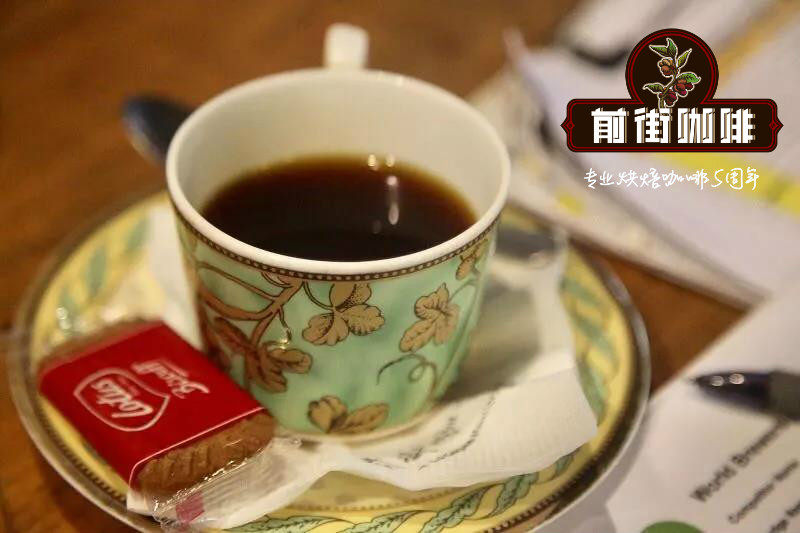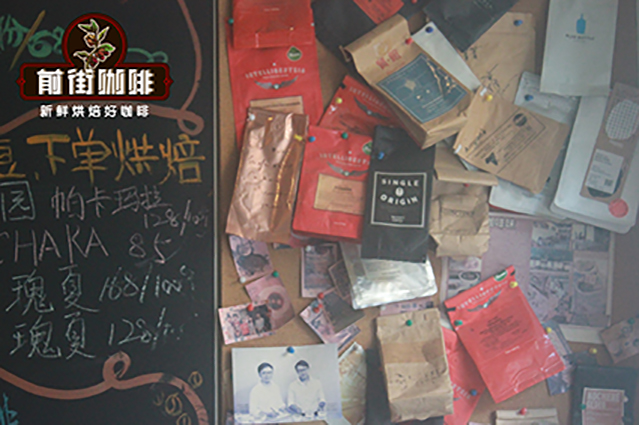Coffee culture differences in different countries do Chinese people like coffee? does Yunnan coffee taste good?

Professional coffee knowledge exchange more coffee bean information please follow the coffee workshop (Wechat official account cafe_style)
French coffee culture
French people drink coffee is a consistent local culture of life, taste! Instead of drinking coffee quickly, they taste it slowly. There are too many open-air cafes where France can sit down and drink coffee, but it may take half a day to drink it.
I have heard that France once drank less coffee because of a shortage of coffee, and immediately saw more people taking a nap. It may seem like an exaggeration, but it is true that the French are addicted to coffee. When the "Gulf War" broke out in 1991, France was also one of the countries participating in the war. some ordinary people in China worried that the war would affect the supply of daily necessities and rushed to supermarkets to buy them. Even the TV station was alarmed by the fact that when the camera looked at customers who were full of "scarce supplies", they found that they took the most coffee and sugar. At one point, it became a big joke at that time. The French do not seem to pay attention to the taste, but the environment and atmosphere. Most of them do not want to drink alone behind closed doors, but join in the fun outside, even if the price of a small cup is enough to make a pot at home. They did not drink hurriedly, but tasted slowly, tasted carefully, read books and newspapers, talked about it, and drank it for most of the day.
French people develop this habit of drinking coffee, whether they consciously express a kind of elegant charm, a kind of romantic sentiment, a kind of freehand feeling of enjoying life. It can be said that this is a traditional and unique coffee culture. Because of this, the places where people can rest and drink coffee in France can be said to be all over the streets, roadsides, squares, riverbanks, cruise ships, and even the Eiffel Tower. And the form, style, size are not limited to one style, there are coffee shops, restaurants, halls, rooms. And the most popular and romantic ones are those open-air cafes, which are almost a portrayal of French life. No wonder the tasteful French have a traditional saying that it may be more difficult to get someone to change a cafe by the Seine than to change a religion! In an authentic cafe, regular customers not only never change their coffee shop easily, but also have a fixed time to come to the cafe and the habit of which coffee table to sit on. Of course, this loyal relationship is also reflected in the hospitable and tireless host, without greeting, the old waiter who is familiar with his frequent customers' temper and hobby will bring his favorite kind of coffee, accompanied by a plate of special snacks, and even bring his favorite newspapers and periodicals, needless to say thank you, which are taken for granted in an authentic cafe.
Vienna coffee culture
Viennese are particularly fond of sweets, and you will find that there is a Viennese coffee in many coffee shops. This is probably Austria's favorite coffee, artistic and sweet to become this cup of coffee, filled with fresh cream and chocolate paste patterns, both delicious and "camera first drink" culture.
Coffee is something that Viennese enjoy talking about and are quite proud of. The Viennese even compare it with music and waltz, which is called the "three treasures of Vienna", which shows the relationship between Viennese and coffee. Some people say that Vienna is "five steps and one coffee", which may be an exaggeration by the poet, but it is true that there are a large number of Vienna cafes. From the coffee kiosks around the corner for people to drink standing up, to the coffee shops gathered by students near the university, to the magnificent coffee shops next to the theatre and by the Imperial City, there are at least dozens, some of which open at 06:30 in the morning and do not close until 2 a.m. Therefore, it is not too much to say that the air of the "capital of music" is not only flowing with the rhythm of music, but also filled with the fragrance of coffee.
Drinking coffee has become a part of life in Vienna. In a leisurely atmosphere, people can meet friends in cafes, play chess, read books, write books, read newspapers (usually provide newspapers from many countries), or watch TV in an inconspicuous corner as long as they pay for a cup of coffee. Some cafes have their own class of customers-the country, writers or politicians-while most cafes are packed with customers of all kinds. The most famous coffee shop in Vienna is the Central Cafe, which is located in the downtown area. Before World War I, it was a meeting place for famous poets, playwrights, artists, musicians and diplomats. Some people say that this is the cradle of many Austrian poems, plays and novels, which may be an exaggeration, but the music masters Mozart, Beethoven, Schubert, the Waltz Dynasty, Strauss and his son were all regulars here. Today's Central Cafe is doing brisk business, but no matter how crowded it is, guests can stay as long as they want. This is a century-old tradition of the Viennese Cafe. There are also many well-known cafes in Vienna, who always have a close relationship with past or present celebrities. Viennese like to tell visitors which artists and writers often meet in which cafe and which politicians like to meet journalists in which cafe. There are many kinds of Viennese coffee, from black coffee to various kinds of coffee with milk, each with its own characteristics, suitable for different tastes, and all have their own names. Therefore, walking into the Vienna Cafe, if you simply want a cup of coffee, the waiter will be at a loss, because there are at least 40 varieties of coffee. If you don't know much about coffee and want to experience the unique atmosphere of the Viennese Cafe, order a cup of "Melange". This thick milk coffee is completely Viennese and has a lingering aftertaste. No matter what kind of coffee you want, you will get a cup of water at the same time-for no reason, just because the water in Vienna is so cool and delicious. But if the waiter brings the guest a second glass of water, he will signal, "you have stayed here too long."
Japanese coffee
The Japanese are best at taking the strengths of various countries and improving them into more "perfect" products, and the same is true of coffee culture. In Southeast Asia, because of the weather, in addition to traditional coffee, another popular thing is iced coffee. The addition of milk and chocolate flavors has made a lot of changes in coffee, and at the same time, it has also introduced a lot of coffee desserts, making Japanese coffee culture an imitation object in Southeast Asia.
The first coffee spread to Japan was Nagasaki in the Yuanlu period. And people officially accepted it from the Meiji era. Now let's take a look at the coffee history of Japan. At first, the Japanese were not used to the successive opening of coffee houses in Western Europe, when the literature and art of coffee culture were in bloom, while Japan was in the midst of the strict policy of locking up countries in the Edo era. Coffee, the first drink at that time, was set up at the Dutch store off the island of Nagasaki (1641) and presumed to have been brought in at that time. However, those who can get in touch with foreigners are servants (officials), businessmen, interpreters and tourist girls.
The real popularity began in the middle of Meiji. Members of the founding literary magazine Hiroshi Kitahara, Woodpecker Ishikawa, Kwangtaro Takamura, Haruo Sato, and Hefeng Nagai meet each month at the "Hung Nest" venue in Hashimachi, Japan. In that shop, you can drink authentic French cuisine and foreign wine, and coffee is also authentic French deep-roasted coffee. The nest of Hong is like a social field for literati.
In the Taisho era, the number of coffee lovers did increase a lot, and it became more popular in the Showa era, but World War II stopped importing coffee because it was an "enemy drink." In Japanese life, coffee disappeared for a moment. Coffee is appreciated and loved by people as "messengers of peace".
At present, the competition in the Japanese coffee market is very fierce. Including tea shop and family coffee and instant coffee, home coffee and office coffee, all kinds of canned coffee, plus hospitality coffee, delicious coffee and so on. In particular, the more authentic demand for coffee in the Pyeongcheng era has also increased.
Important Notice :
前街咖啡 FrontStreet Coffee has moved to new addredd:
FrontStreet Coffee Address: 315,Donghua East Road,GuangZhou
Tel:020 38364473
- Prev

Hand-brewed coffee beans recommend coffee beans to choose entry-level Japanese special hand-flushing methods.
Professional coffee knowledge exchange more coffee bean information Please follow the coffee workshop (Wechat official account cafe_style) the Japanese love hand-brewed coffee, the general method is to pay attention to the big arm to drive the forearm, turn slowly, keep the wrist motionless, and then adjust the speed, size and strength of the water according to the cleanliness and thickness of the coffee you want to brew. The Japanese have a variety of ways to make coffee, each
- Next

Known as the best embodiment of the spirit of Japanese coffee workers-Ichiro Kanaguchi
Professional coffee knowledge exchange more coffee bean information please follow Coffee Workshop (Wechat official account cafe_style) Japanese coffee legend and founder of Amber Coffee Ichiro Kanaguchi died on March 14, 2018 at the age of 103. He worked hard for the coffee industry all his life, insisting on baking high-quality coffee, not to mention retirement. He was the oldest coffee job in Japan.
Related
- What documents do you need to go through to open a coffee shop? coffee shop coffee shop certificate processing process
- How to purchase Coffee beans in small Cafe how to choose a suitable supplier for domestic Coffee supply Company
- How to drink Starbucks Fragrance White Coffee? how to make Australian White Coffee? what Italian coffee beans are recommended?
- The Story of Flora Coffee: the name of Flora Coffee Bean and the implication of the Flowers on Florna Coffee
- How much does a cup of coffee cost? How much is the profit of a cup of coffee? What is the profit of the coffee shop in a year?
- Yunnan small Coffee, known as "fragrant Coffee", introduces the characteristics of Alpine Arabica Coffee producing areas in Yunnan, China
- 2023 latest Starbucks full menu price list how much is a cup of Starbucks coffee what is better to drink the most popular hot and cold drinks recommended
- Starbucks different kinds of Coffee Price list Starbucks menu 2023 Top Ten Best drinks in Starbucks
- Starbucks Spring praise Comprehensive matching Coffee Bean theme Story Packaging implication and taste description
- The cost of a cup of coffee latte American coffee cost price and selling price

